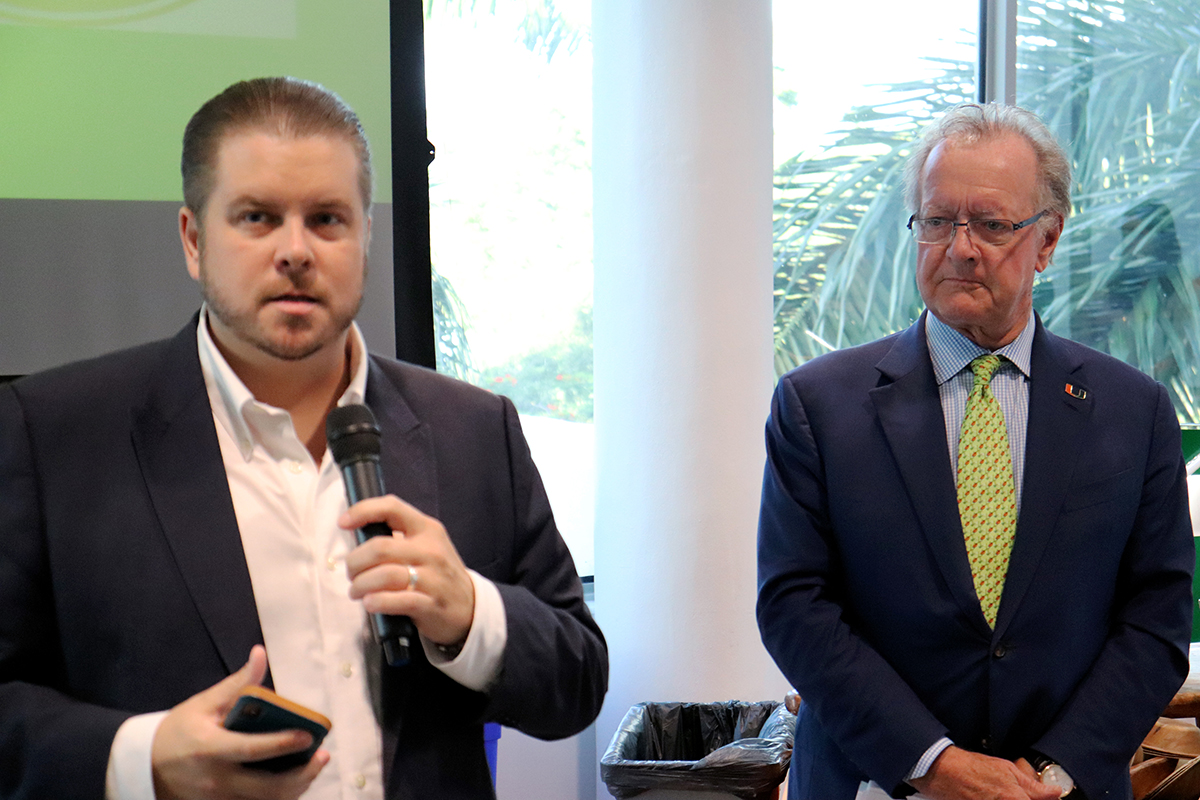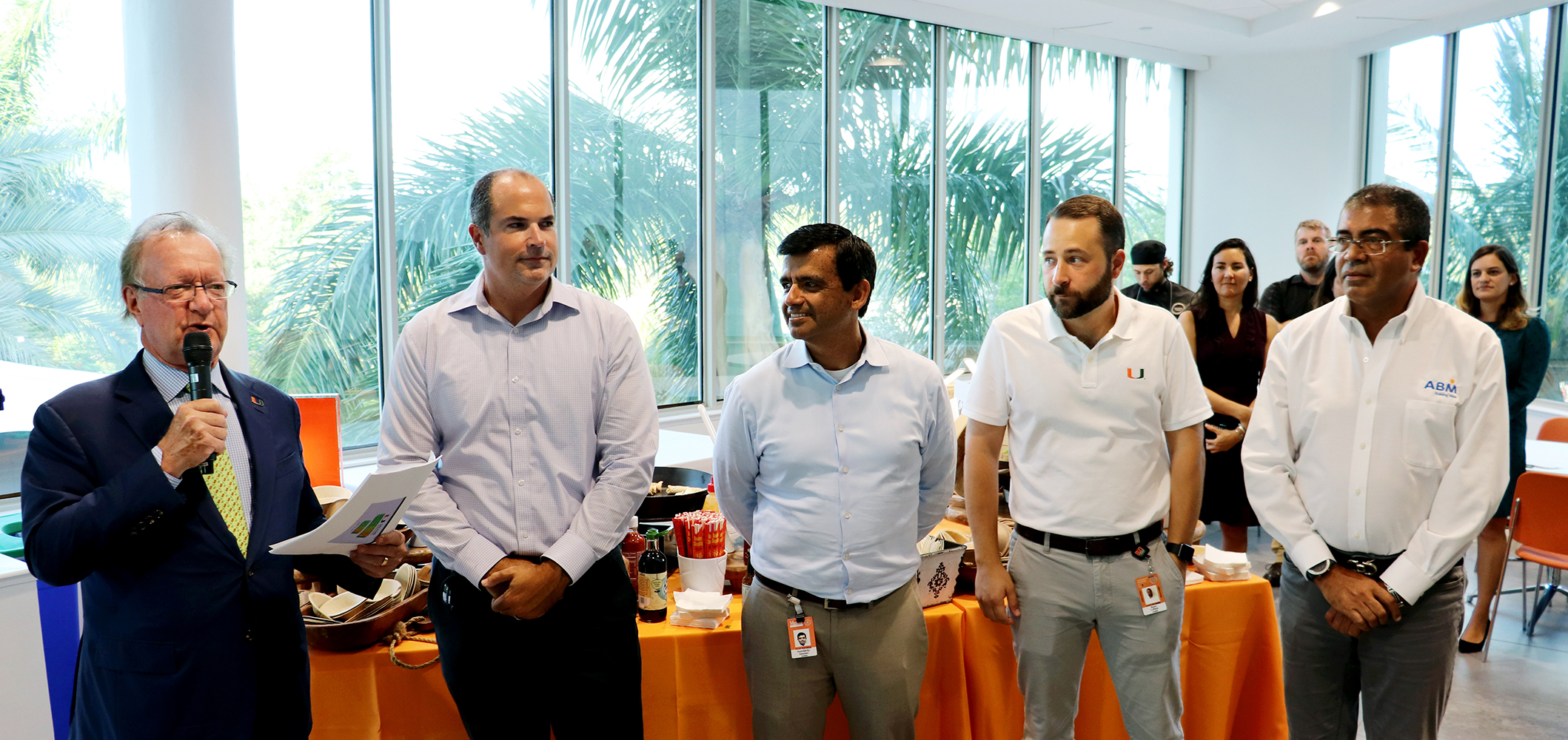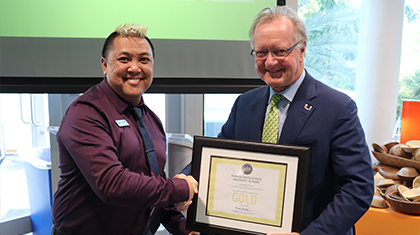The prestigious accomplishment was the centerpiece of a USGBC ceremony held at Miami Business School (MBS), which featured a presentation of LEED certification by USGBC Miami and The Spinnaker Group, the project's LEED consultant, to John Quelch, the Dean of Miami Business School.

"As Miami Business School proudly launches its new MS degree in Sustainable Business, it’s essential that we walk the talk," said Dean Quelch. "Congratulations to our staff and students for securing LEED certification for our buildings. We hope this motivates other University of Miami Schools and Colleges to do the same.”
This accomplishment notes significant performance highlights of the 163,885 square foot facility. The project encompassed the facility that had been expanded on since its original 1982 opening date. Sustainable design accomplishments include:
- The building is 30% more energy efficient than the national average of university college buildings.
A high focus on student and staff ergonomics and comfort with state-of-the art furniture, indoor foliage, and beautiful views to the outside in nearly every occupied space. - Staff and student experience are matched with efficiency with more than 90% LED lighting, in-room air quality sensors, audio/visual and tele-presence technology, and automatic window shading.
- One of the most visited and high-transient buildings on campus made the focus on waste reduction efforts a priority -- with notable success: an average of 60% of the waste generated is sent to recycling, recovery or reuse. Students, staff and faculty participated in a waste audit that resulted in discovering the 60% diversion rate, which offered a great reward as well as an opportunity for further education and improvement.
- This project achieved an unprecedented turnaround compared to most LEED for Existing Building projects throughout the country, from an average of 1.5 years to 6 months. Credit for this noteworthy achievement largely goes to the hard work and collaboration of the project team, university staff, and contractors.
- The University of Miami Sustainability and Energy Teams set the Business School building on a course to continually track and improve its performance. By being transparent and entering building performance data into the Arc Global platform, the continuous efforts to improve the facility will aid in setting the bar for performance standards of buildings of its kind everywhere.
- Through an effectively managed O&M process, the MBS will continuously work to improve water and energy conservation efforts and be resource-efficient while meeting the comfort, health and safety requirements of the building occupants.
- The LEED for Existing Building O+M certification process brought together various on-campus departments including Operations, Maintenance, Construction, Catering, Engineering, Purchasing, Janitorial, Academic, and Administration, effectively binding them into achieving the operational goals and standards to excel with sustainable operations.
- As part of the project's carbon-footprint assessment, a survey was conducted of all faculty, staff and students that captured their commuting habits and use of multi-modal transportation such as Metrorail, transit, Brightline, Tri-Rail and bicycle.
- In order to maintain a healthy indoor environment, an indoor air-quality test was conducted throughout all of the occupied spaces in the building in order to quantify levels of formaldehyde, carbon monoxide and other harmful chemicals.
- This is the first LEED Existing building that has been certified on the UM campus.
Lastly, the campus wide Green U Program () deserves a shout-out for its support and its "excellence in student engagement and staff programs that are focused around sustainable operations."

"This project is a true demonstration of the possibilities and capabilities of existing buildings and the efficiency of the newly launched LEED v4.1 for Existing Buildings," said Jonathan Burgess, Principal of The Spinnaker Group. "We enjoyed working with the talented professionals from the University and the supporting vendors and contractors working at the Business School. Our integrated team approach significantly reduced the project's environmental footprint and achieved noteworthy turnaround time. Students and faculty at the beautiful Miami Business School will be the most important beneficiaries of the University's green vision come to fruition."
"Achieving LEED certification is more than implementing sustainable practices. It represents a commitment to making the world a better place and influencing others to do better,” said Mahesh Ramanujam, president and CEO, USGBC. "The University of Miami is demonstrating tremendous leadership through the LEED Gold certification of its business school, and the Spinnaker Group continues to set the sustainability bar with each new LEED project it supports."
LEED, or Leadership in Energy and Environmental Design, is the most widely used green building rating system in the world. Available for virtually all building, community and home project types, LEED provides a framework to create healthy, highly efficient and cost-saving green buildings. Created by the U.S. Green Building Council in Washington, DC, LEED certification is a globally recognized symbol of sustainability achievement.
The voluntary, consensus-based rating system for developing high-performing, sustainable buildings is designed to inspire project teams to seek innovative solutions that support public health and our environment, while saving building owners money over a project’s life cycle. LEED Accredited Professionals (LEED APs) have demonstrated a thorough understanding of green building techniques and the LEED Green Building Rating System.

